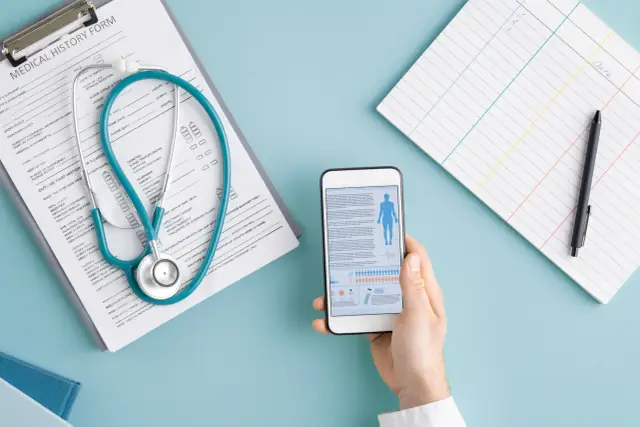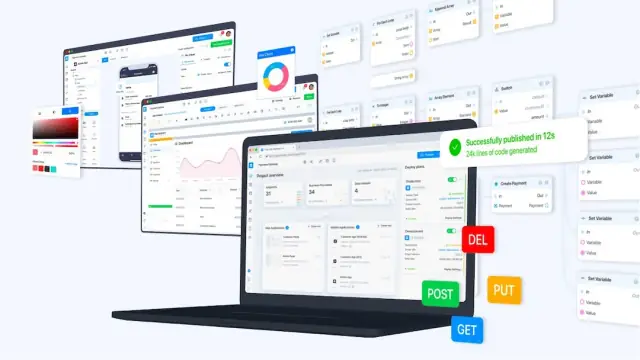Mobile App Generators in Healthcare: A Revolutionary Shift
Explore how mobile app generators revolutionize healthcare by enabling rapid deployment of customized applications to enhance patient care without requiring deep coding.

Traditionally, mobile app development has been an intricate task reserved for skilled programmers with an in-depth understanding of coding languages and development frameworks. The complexity of crafting an app from scratch entailed a long development cycle, significant financial investments, and an ongoing commitment to maintain and update the application over time.
This is where mobile app generators have become a game-changer. These innovative platforms stand as digital artisan workshops, where one can sculpt professional-grade mobile applications without the intricate web of traditional programming. They enable individuals, developers or those with little to no coding experience, to swiftly navigate the app creation journey.
With the advent of no-code and low-code solutions, mobile app generators harness the power of user-friendly interfaces, pre-built templates, and drag-and-drop simplicity to democratize the app development process. Users can select desired functionalities, stitch together user interfaces, and infuse their brand's aesthetic, all within a fraction of the time and cost associated with customary development paths.
These platforms are not just about ease of use; they present a diverse toolkit where customization and scalability don't take a back seat. Advanced generators can integrate with databases, extend functionalities through third-party APIs, and even customize the underlying logic with minimal coding. This makes them a powerhouse for entrepreneurs, businesses, and institutions wanting to pivot quickly and streamline operations with mobile technology.
Mobile app generators have ignited a revolutionary shift in the design and development of mobile apps. Now, with platforms like AppMaster, this technology takes a bold stride forward, eliminating traditional barriers and opening up a realm of possibilities for app creation across various industries, including healthcare, which stands to gain immensely from these agile development methods.
Unlocking Healthcare Advancements: The Benefits of Mobile App Generators
The healthcare industry is witnessing a digital transformation, and mobile app generators play a significant role in this change. These generators allow healthcare providers to quickly adapt and respond to ever-changing patient needs and industry standards by simplifying the app development process. The introduction of mobile app generators means that healthcare organizations can easily develop applications tailored to various functions, from administrative operations to direct patient care.
One of the main impacts of mobile app generators on healthcare is the democratization of app development. Clinics, hospitals, and individual practitioners who may not have the resources to hire a full-scale development team can now design, implement, and manage mobile solutions that support patient engagement, health tracking, and data management. This newfound accessibility is not just limited to large institutions but empowers small practices to innovate and improve their service delivery.
Another significant impact is the enhancement of patient experiences. Through mobile apps, patients can easily schedule appointments, receive reminders, communicate with their healthcare providers, and access their health records at their convenience. This ease of access can improve patient adherence to treatment plans and follow-ups, thus improving health outcomes. Also, during periods like the pandemic, healthcare mobile apps have been instrumental in providing telehealth services, enabling remote consultations and maintaining social distancing protocols.

Mobile app generators also facilitate real-time data collection and analysis. Apps can be designed to capture patient data, which can be invaluable for monitoring chronic conditions or research. Analyzing this data can lead to a more informed decision-making process and personalized healthcare strategies. Furthermore, these apps can be integrated with wearables and other IoT devices, consolidating a large amount of health data from diverse sources for comprehensive care management.
In addition, mobile app generators ensure compliance with stringent healthcare regulations. Platforms like AppMaster offer tools and safeguards that ensure the generated applications adhere to compliance standards such as the Health Insurance Portability and Accountability Act (HIPAA) in the United States. By providing these built-in compliance mechanisms, app generators significantly reduce the risk of data breaches and unauthorized access to sensitive health information.
The cost-effectiveness introduced by app generators cannot be overstated. Healthcare providers can save on costs associated with hiring developers, purchasing expensive software licenses, or undergoing long development cycles. Instead, they can utilize platforms like AppMaster to create applications at a fraction of the cost and time, with the added advantage of easy modifications and updates as healthcare regulations and technologies evolve.
Mobile app generators have created a revolution in healthcare, bringing forth a wave of innovation previously hindered by traditional app development's technical and financial barriers. The ability to develop engaging, compliant, and cost-effective mobile solutions has become a powerful tool in advancing healthcare services, making mobile app generators a cornerstone of modern healthcare's digital strategy.
Features of Healthcare Mobile Apps
The utility of mobile apps in healthcare is derived from their powerful feature sets that cater to the intricate needs of the industry. It's crucial that these apps not only streamline the user experience for patients and providers but also integrate seamlessly with existing healthcare systems. Below are some of the essential features that healthcare mobile apps tend to include:
- Appointment Scheduling: Simplifying booking and managing appointments is a fundamental feature. Patients can view available time slots and book visits directly through the app, reducing administrative workload for staff.
- Telemedicine: As remote consultations become increasingly common, telemedicine features allow patients to connect with healthcare providers via video calls, which is especially beneficial for those in remote or underserved areas.
- Patient Portals: Secure patient portals provide access to personal health information, test results, and medical history, empowering patients to take an active role in their health management.
- Medication Tracking and Reminders: To ensure compliance with treatment plans, apps can offer medication tracking and set reminders for when it's time to take prescribed drugs.
- Healthcare Records Integration: Seamless integration with Electronic Health Records (EHR) systems ensures that all patient data is synced and up-to-date, which is crucial for accurate diagnosis and treatment.
- Payment Systems: In-app payment systems enable patients to settle bills for services rendered, reducing in-person contact and streamlining the billing process.
- Push Notifications: Notifications are reminders for appointments, prescription refills, and other important health-related actions.
- Wearable Device Integration: Connecting the app with wearable health devices allows for constant monitoring of vital signs, contributing to better outcomes in chronic disease management.
- In-app Messaging: Secure messaging systems within the app facilitate communication between patients and healthcare providers, ensuring privacy and compliance with healthcare regulations.
- Access Control: Role-based access control is essential to protect sensitive health data. It ensures that only authorized individuals can access certain information, in compliance with privacy laws.
- Reporting and Analytics: For healthcare providers, the ability to glean insights from data is valuable. Apps often include reporting tools for analyzing appointment trends, patient health outcomes, and more.
- Customizable User Experience: Since no two healthcare providers or patients are alike, the ability to customize the app's features based on specific needs is a compelling advantage offered by platforms like AppMaster.
These features enhance the functionality of healthcare applications and contribute to a more connected and streamlined healthcare experience. The AppMasterno-code platform empowers creators to easily incorporate such comprehensive features into their healthcare applications, effectively addressing the specific challenges of the healthcare sector.
Critical Considerations for Healthcare App Development
Creating healthcare applications comes with its own challenges and requirements that developers must navigate carefully. Not just functionality counts; the applications must also be trustworthy and compliant with various healthcare standards. Let's dive into some critical considerations for healthcare app development, particularly when using mobile app generators.
Compliance with Healthcare Regulations
Healthcare applications must adhere to strict laws and regulations such as the HIPAA in the U.S., the General Data Protection Regulation (GDPR) in the EU, and other region-specific guidelines. This involves ensuring data protection, patient privacy, and secure data exchange.
Data Security and Privacy
Patient data is highly sensitive, and safeguarding this information is paramount. Implementing strong encryption methods, secure authentication mechanisms, and consistent data monitoring and audits is crucial to prevent unauthorized access and data breaches.
Interoperability with Existing Systems
For healthcare apps to be effective, they should seamlessly integrate with existing healthcare systems, such as EMRs, laboratory information management systems (LIMS), and other diagnostic and clinical applications. This interoperability ensures a unified and efficient healthcare experience.
User Experience and Accessibility
Healthcare apps are used by diverse users, including patients, doctors, and administrative staff. The design must be intuitive, accessible, and cater to the needs of all users, with clear navigation and readable content, even for those with disabilities.
Quality Assurance and Testing
Thorough quality assurance processes and rigorous testing routines are necessary to ensure the app performs accurately, particularly when dealing with patient data and critical healthcare functionalities. Continuous testing helps maintain the reliability and credibility of the app.
Legal and Ethical Considerations
Developers must consider the ethical implications of their healthcare applications, especially with regards to AI and machine learning algorithms. Ensuring that the app doesn't perpetuate biases and adheres to legal statutes governing patient care is also essential.
Scalability and Performance
Healthcare apps should be designed to handle an increasing number of users and data loads without compromising performance. Scalability is key to supporting the growing demands of a dynamic healthcare environment.
Platforms like AppMaster recognize these intricacies and provide no-code solutions that address these critical factors. By automating parts of the compliance and security processes and offering easy integration capabilities, such platforms facilitate the development of healthcare apps while meeting high quality and regulation standards.
AppMaster's Contribution to Healthcare Mobile Apps
The healthcare industry is increasingly turning to technology to solve complex challenges, improve patient care, and streamline operations. Amid this backdrop, AppMaster has positioned itself as a critical tool in the technological toolkit for healthcare professionals, enabling them to develop mobile applications tailored specifically for the unique demands of the health sector.
With its no-code development environment, AppMaster allows healthcare institutions to bypass traditional programming constraints and harness the power of rapid application deployment. This capability can be revolutionary because healthcare needs are often dynamic and time-sensitive.

Here's how AppMaster is making a difference in the healthcare mobile app market:
- Compliance with Healthcare Standards: The platform is designed with the overarching need for compliance in mind. AppMaster provides a framework that ensures apps adhere to established healthcare standards, such as HIPAA, ensuring patient data is handled securely and with the utmost confidentiality.
- Integration Capabilities: AppMaster facilitates seamless integration with EHR systems and other healthcare databases. This enables healthcare providers to create interconnected systems that improve data flow and patient management.
- Customizable Functionality: The platform's versatility allows for creating custom features, ranging from appointment scheduling to remote patient monitoring, all of which can be tailored to the specific needs of patients and clinicians.
- Data Security: Considering the sensitivity of health-related data, AppMaster prioritizes strong security measures. The generated apps incorporate advanced security protocols to safeguard against data breaches and unauthorized access.
- Empowering Citizen Developers: By simplifying the development process, AppMaster empowers healthcare professionals who may not have a background in programming to create and manage their own applications. This democratization of app development ensures that solutions are built with a deep understanding of healthcare workflows and patient needs.
- Scalability for High Demand: Apps created with AppMaster are built to scale, which is crucial in healthcare scenarios where the number of app users may surge unpredictably, such as during a health crisis or pandemic.
The advent of mobile app generators has not merely accelerated the pace of healthcare app development; it has redefined what's possible. With platforms like AppMaster, the healthcare industry can execute ideas more swiftly and securely, resulting in better outcomes for providers and patients. Already, countless healthcare professionals leverage the speed and flexibility of AppMaster to improve services and patient experiences. As the industry advances, the role of AppMaster and similar platforms will only grow more integral to healthcare innovation.
Future Trends in Healthcare Mobile Apps
The trajectory of technological advancement in healthcare suggests a future where mobile apps are not just auxiliary tools but integral components of the healthcare ecosystem. As we look towards the horizon, several trends show promise in enhancing patient care and operational efficiency through mobile application innovation.
One emerging trend is incorporating Artificial Intelligence (AI) and Machine Learning (ML) into healthcare apps. These technologies enable predictive analytics and pattern recognition, which can be used to identify potential health risks and suggest preventive measures. Furthermore, AI-powered chatbots may serve as patients' first point of contact, providing immediate responses to health concerns and streamlining the care process.
Another development is the increasing personalization of healthcare through apps. With advancements in data analytics, mobile platforms could provide tailored health recommendations and treatments. This hyper-personalization means that patients can receive care uniquely suited to their genetics, lifestyle, and medical history, significantly improving outcomes.
Wearable technology integration is also set to expand the capabilities of healthcare apps. By seamlessly syncing data from devices such as fitness trackers and smartwatches, healthcare providers can monitor patients' health metrics in real-time, enabling proactive care and detailed health assessments outside the clinic.
Interoperability between healthcare mobile apps and electronic health systems is another trend that's gaining traction. As data exchange standards evolve, a more cohesive healthcare IT ecosystem will enable apps to communicate with various databases and systems, improving continuity of care and the patient experience.
With cybersecurity becoming an ever-increasing concern, future healthcare apps will likely emphasize advanced security protocols to protect sensitive data. This will include the implementation of end-to-end encryption, secure authentication methods, and regular security audits to mitigate the risk of data breaches.
The evolution of healthcare mobile apps is primed to deliver more intelligent, personalized, and secure experiences. With platforms like AppMaster, the deployment of such future-forward apps becomes significantly more iterative and responsive to the dynamic needs of the healthcare industry.
Conclusion
The embrace of mobile app generators in the healthcare industry signifies a dramatic and positive shift in how medical services are planned, coordinated, and delivered. This revolutionary technology directly supports more efficient, patient-centered care by harnessing the speed and flexibility of no-code solutions like AppMaster. It offers a democratic tool for healthcare professionals, allowing them to transcend traditional barriers in software development and focus on what they do best — caring for patients.
The advent of mobile app generators has paved the way for healthcare providers to quickly create functional and personalized applications and do so in a manner that aligns with strict industry regulations and privacy standards. As we look to the future, we can anticipate that the continued innovation in mobile app generators will further empower healthcare organizations to meet the ever-evolving needs of their patients and the industry at large.
By providing an accessible avenue for app creation, platforms like AppMaster are transforming the mechanics of application development and contributing to a more connected and technologically proficient healthcare environment. The expansion of mobile healthcare apps promises to bridge gaps in healthcare delivery and epitomizes the next wave of digital healthcare innovation.
FAQ
Mobile app generators are platforms that allow users to build mobile applications using user-friendly interfaces and pre-made templates, typically without needing to write traditional code.
Mobile app generators are significant in healthcare because they enable the rapid development and deployment of apps that can support telemedicine, digital records, and patient care, helping to meet the growing demand for digital healthcare solutions.
Healthcare mobile apps often include appointment scheduling, patient portals, telemedicine capabilities, and integration with Electronic Health Records (EHR), among other features.
Healthcare apps must comply with stringent regulatory requirements such as HIPAA, as well as ensure the security and privacy of patient data.
AppMaster offers a no-code platform that allows for creating secure and compliant healthcare apps, streamlining the development process and ensuring that apps meet the strict standards necessary for healthcare applications.
Future trends in healthcare mobile apps may include the integration of AI, machine learning, and the provision of more personalized care through mobile platforms.
Yes, mobile app generators like AppMaster are designed to be user-friendly, enabling both developers and non-developers to create functional and sophisticated healthcare apps.
Mobile app generators like AppMaster include security features and compliance checks to ensure that the healthcare apps built with their platforms adhere to industry standards and regulations.
Yes, apps created with AppMaster can often be configured to integrate with existing healthcare systems, enhancing the capability and efficiency of healthcare providers.
The benefits include rapid development times, cost savings, adherence to compliance standards, and the ability to customize apps to meet specific needs of healthcare providers.





